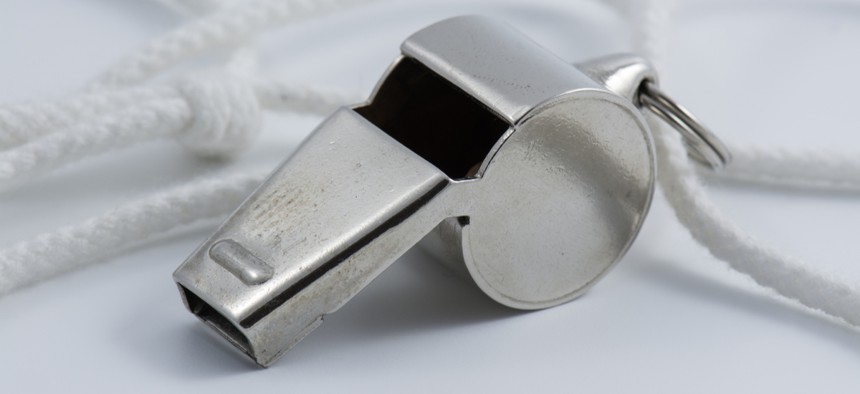What Federal Employees Might Want to Know Before Blowing the Whistle to Congress

peepy/Shutterestock.com
Volume of disclosures rises when congressional oversight dominates the news, watchdog notes in new primer.
Agency employees who spot wrongdoing confront a bewildering array of options on where to turn should they choose to brave the role of whistleblower.
The Government Accountability Office on Tuesday released a primer on what outlets Congress has created to receive complaints. The guide lays out the four phases of the process: intake (tracking reports and assuring secure communications), prioritization (reviewing rankings regularly and keeping whistleblowers informed); referrals for discipline (negotiating on release of personal information); and follow-up (evaluating lessons learned and setting whistleblower expectations).
Some whistleblowers have run into a buzzsaw pitting their agency managers who need to protect classified information against lawmakers who practice oversight of agencies to uncover waste, fraud and abuse.
“While data are not available on the number of whistleblower disclosures across Congress, a staff member at one congressional office said the office can receive hundreds of whistleblower disclosures each year,” GAO wrote. “Oversight committee staff told us that the volume of whistleblowers their offices receive tends to increase when congressional oversight issues are prominent in the news media. They said that congressional oversight actions—such as letters to agency officials—can signal congressional interest to agency employees and influence whistleblower disclosures to Congress.”
The primer, required in a report that accompanied the fiscal 2019 legislative appropriations bill, was addressed to Reps. Tim Ryan, D-Ohio, chairman of the subcommittee overseeing legislative branch spending, and ranking member Rep. Jaime Herrera Beutler, R-Wash. GAO’s research from July 2018 to May 2019 included “a Web-scraping program to identify congressional websites with terms related to whistleblowing (e.g., ‘whistleblower,’ ‘whistle blow,’ ‘blow the whistle,’ ‘whistleblower hotline,’ and ‘whistleblower tipline’).”
Interviews about training on handling whistleblowers included staff on the House Rules Committee, the House Administration Committee, the Senate Committee on Rules and Administration, the House Committee on Ethics and Senate Select Committee on Ethics, and the House and Senate Counsel. Also consulted were the Congressional Research Service, the nonprofit Project on Government Oversight and the nonprofit Government Accountability Project, the report said.
GAO also interviewed staff from the office of a member of the House Whistleblower Protection Caucus, the Office of Special Counsel, and the Council of the Inspectors General on Integrity and Efficiency.
The potential pool of whistleblowers was defined as civilian federal employees (current employees, former employees, and applicants for federal employment), contractors, subcontractors and grantees. (Not included are service members or employees who are part of the intelligence community “as their options for disclosing, available protections, and recourse options differ,” GAO noted.)
Charts lay out the kinds of practices that are disclosable to Congress at different types of agencies.
Congressional staff are trained to work with whistleblowers “making any type of protected disclosure, whether or not they have made this disclosure elsewhere or if any related actions, including reprisals, have occurred,” the report said. Staff said direct experience is important for building skills to effectively work with whistleblowers, stressing that the best way to gauge a whistleblower’s reliability is through contact in person or by phone.
NEXT STORY: Quick Hits



